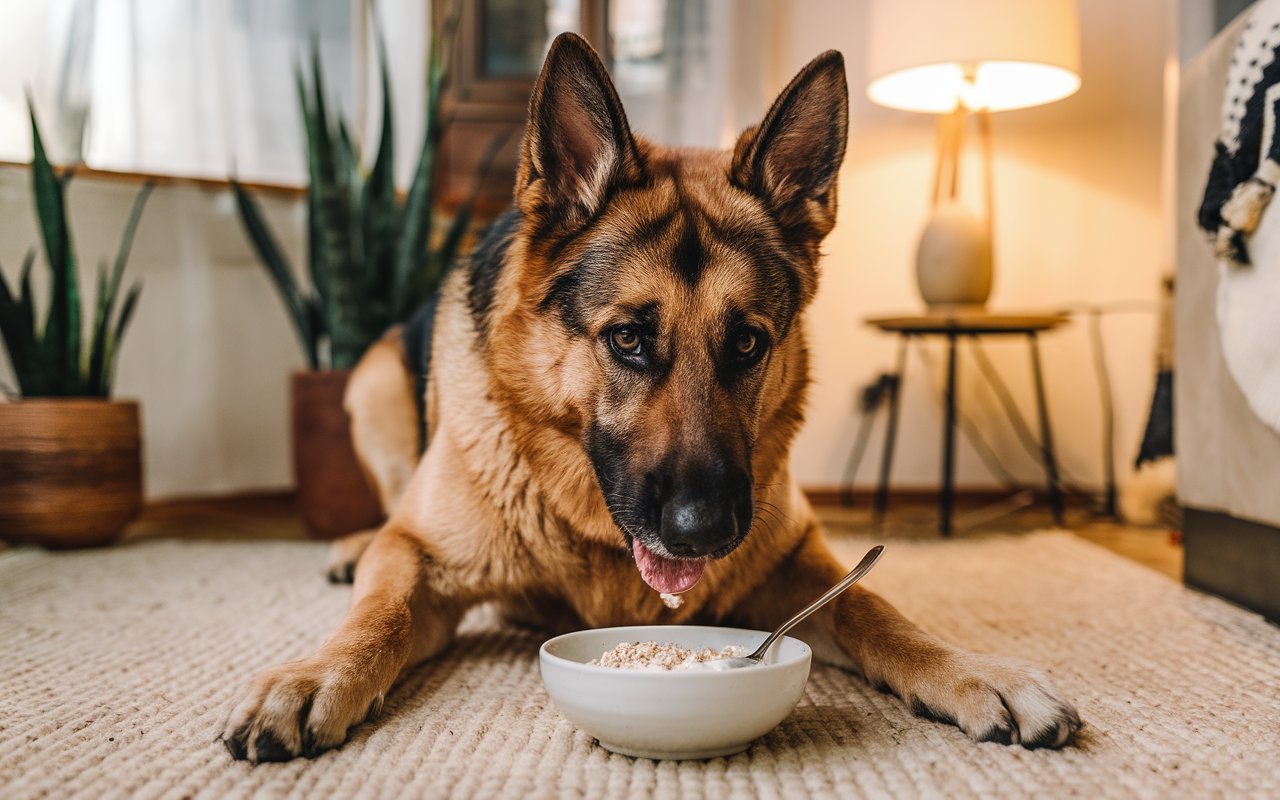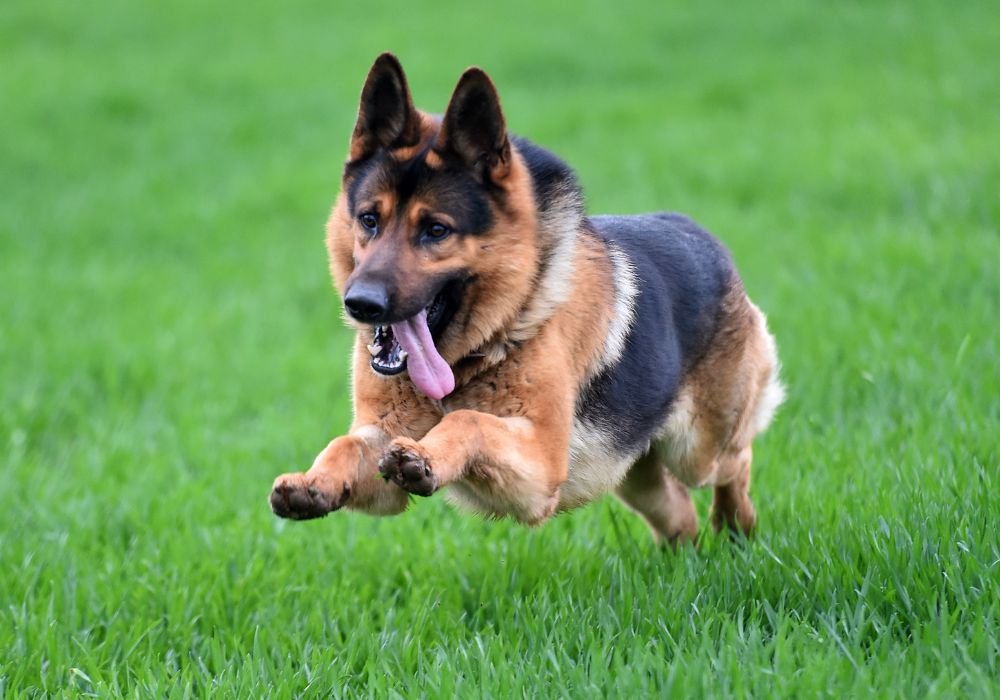Top 10 German Shepherd-Approved Breakfasts: Morning Meal Magic
Just like humans, German Shepherds require a nutritious breakfast to kickstart their day. These intelligent and active dogs burn significant energy, making their morning meal crucial for maintaining stamina and focus. A well-balanced breakfast provides essential nutrients that fuel their muscular body and support their high energy requirements throughout the day.
Top 10 German Shepherd-Approved Breakfasts
1. The Classic Egg and Meat Combo
Start your German Shepherd's day with a protein-rich combination of scrambled eggs and lean meat. Two scrambled eggs mixed with small pieces of cooked chicken breast provide approximately 25 grams of high-quality protein. Add a tablespoon of finely chopped carrots for vitamin A and fiber. This breakfast option supports muscle maintenance and provides sustained energy release.

Many German Shepherd owners report improved coat condition and increased morning alertness when incorporating eggs into their dogs' breakfast routine. Remember to cook the eggs thoroughly to prevent any potential bacterial concerns.
2. Yogurt and Berry Power Bowl
Plain, unsweetened yogurt mixed with dog-safe berries creates a nutrient-dense breakfast option. Use one cup of Greek yogurt (higher in protein than regular yogurt) and add a handful of blueberries and strawberries. The probiotics in yogurt support digestive health, while berries provide essential antioxidants.
This breakfast combination offers approximately 15 grams of protein and beneficial compounds that support your shepherd's immune system. The natural sweetness of berries makes this meal particularly appealing to most dogs.
3. Lean Turkey and Sweet Potato Hash
Create a morning hash using ground turkey and sweet potatoes. Cook one cup of lean ground turkey with half a cup of diced sweet potatoes. This combination provides both protein and complex carbohydrates, essential for sustained energy release.
Sweet potatoes offer beta-carotene and fiber, while turkey provides lean protein without excess fat. This breakfast typically contains about 30 grams of protein and beneficial complex carbohydrates.
4. Salmon and Rice Morning Bowl
Wild-caught salmon mixed with brown rice creates an omega-3 rich breakfast option. Use 4-5 ounces of cooked salmon combined with half a cup of cooked brown rice. This meal supports coat health, reduces inflammation, and provides sustained energy.
The omega-3 fatty acids in salmon are particularly beneficial for joint health, making this an excellent choice for active German Shepherds.
5. Cottage Cheese and Fruit Medley
Low-fat cottage cheese serves as an excellent protein source, while fresh fruits add necessary vitamins and minerals. Combine one cup of cottage cheese with small pieces of apple (without seeds) and pear. This breakfast provides approximately 28 grams of protein and essential calcium.
The natural enzymes in fruits aid digestion, while the protein in cottage cheese supports muscle maintenance.
6. Chicken and Vegetable Breakfast Bowl
Create a nutrient-rich bowl using:
• 1 cup diced cooked chicken breast
• ¼ cup steamed broccoli
• ¼ cup carrots
• ¼ cup green beans
• 2 tablespoons olive oil
This combination provides complete nutrition with balanced protein, vitamins, and healthy fats.
7. Oatmeal and Protein Power Mix
Cook steel-cut oats and mix with a protein source like turkey or chicken. Add a tablespoon of pumpkin puree for fiber and vitamin A. This breakfast provides sustained energy release and supports digestive health. The combination of complex carbohydrates and protein helps maintain stable blood sugar levels throughout the morning.

8. Bone Broth Enhanced Rice Bowl
Create a warming breakfast by cooking rice in homemade bone broth. Add small pieces of cooked beef or chicken. The gelatin in bone broth supports joint health, while the rice provides necessary carbohydrates for energy.
9. Turkey and Egg Scramble
Combine scrambled eggs with ground turkey for a protein-packed breakfast. Add finely chopped spinach for iron and other minerals. This breakfast typically provides 35 grams of protein and essential nutrients.
10. Weekend Special: Meat and Vegetable Muffins
Create special breakfast muffins using:
• Ground lean meat (turkey or chicken)
• Eggs
• Finely chopped vegetables
• Small amounts of coconut flour can be made in advance and frozen for convenience.
How to Transition Your German Shepherd to a New Breakfast Routine?
Introducing new breakfast options requires patience and careful observation. Start by mixing 25% of the new food with 75% of their current breakfast for the first few days. Gradually increase the proportion of new food while decreasing the old over 7-10 days. This slow transition helps prevent digestive upset and allows you to monitor your dog's response to new ingredients.
Watch for signs of acceptance or rejection, such as enthusiasm during meal times or any changes in stool consistency. If your German Shepherd shows any signs of digestive issues, slow down the transition process.
Remember that some dogs may take longer to adjust to new foods, so be patient and consistent with the transition process. Keep a food diary to track which breakfast combinations work best for your pet.
Best Breakfast Serving Times and Portion Control Tips
Establishing a consistent breakfast schedule helps regulate your German Shepherd's metabolism and digestive system. The ideal time for breakfast is typically between 6:00 AM and 8:00 AM, allowing proper digestion before morning activities or exercise.
Portion control is crucial for maintaining a healthy weight. Adult German Shepherds typically need between 2-3 cups of food for breakfast, but this can vary based on factors like:
- Age and size
- Activity level
- Overall health condition
- Weather and season
- Training Schedule
Monitor your dog's weight and energy levels regularly to adjust portions as needed. Use a measuring cup rather than estimating portions to ensure consistent serving sizes. If your German Shepherd seems hungry between meals, consider dividing their daily food allowance into smaller, more frequent meals rather than increasing portion sizes.

Frequently Asked Questions
How much breakfast should I feed my German Shepherd?
Adult German Shepherds typically need 2-3 cups of food for breakfast, depending on their size and activity level.
When should I feed breakfast to my German Shepherd?
Ideally, serve breakfast at the same time each morning, typically between 6-8 AM.
Can I prepare these breakfasts in advance?
Most of these meals can be prepared in advance and stored in the refrigerator for 2-3 days.
Should I add supplements to breakfast?
Consult your veterinarian about specific supplement needs, as they vary based on your dog's age and health condition.
Conclusion
Providing your German Shepherd with a nutritious breakfast sets them up for daily success. These breakfast options ensure your dog receives adequate protein, healthy fats, and necessary nutrients. Remember to introduce new foods gradually and adjust portions based on your dog's specific needs. Monitor their energy levels and adjust breakfast portions accordingly to maintain optimal health and vitality.









Comments